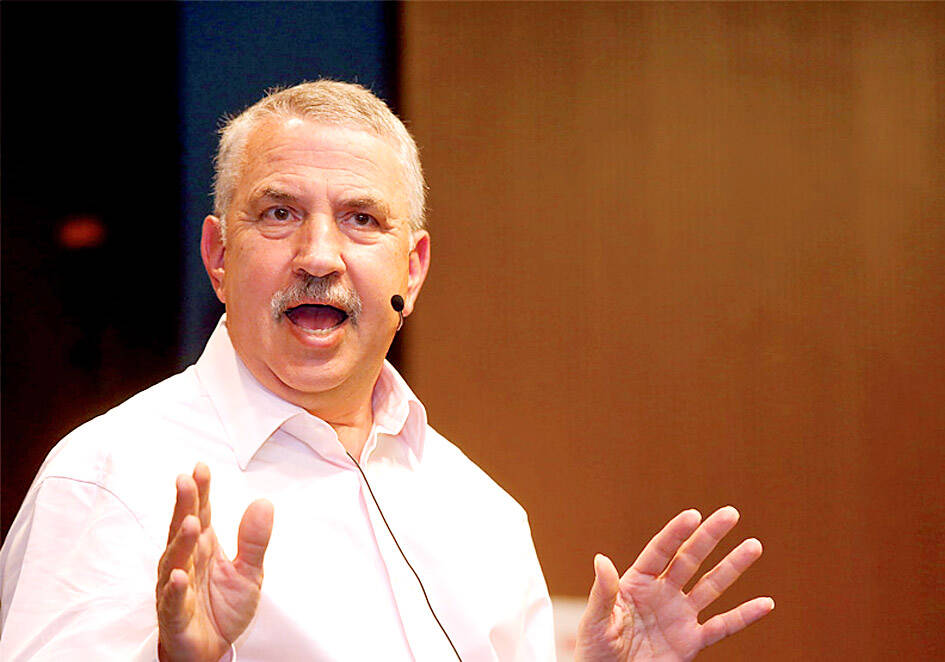Taiwan should make itself “indispensable” for the global economy and refrain from provoking China, three-time Pulitzer Prize winner Thomas Friedman told a business forum in Taipei yesterday.
Friedman, who writes opinion articles about foreign affairs, globalization and technology for the New York Times, was commenting on Taiwan-US-China relations at a forum held by Taiwan-based Global Views monthly, in a pre-recorded video.
“If I were president for a day of Taiwan, I would be focusing on building and reinforcing my strengths,” Friedman said.

Photo: Reuters
“Taiwan is the single greatest chipmaking country in the world, thanks to TSMC [Taiwan Semiconductor Manufacturing Co]. And I would be looking for areas where I can reinforce my global leadership to make myself indispensable for the global economy,” which would make China less likely to attack Taiwan, he said.
“Every day that Taiwan remains a thriving economy, and independent, for me, is a good day,” Friedman said.
However, Taiwan should refrain from provoking Chinese leaders or altering the “status quo” in the Taiwan Strait, he said.
Referring to China as a “bear,” Friedman said Taiwan should not be “looking to poke the bear … because you never know when the bear is just going to swipe you with its paw.”
Instead, Taiwan should “stay low-key” and “be quiet” while continuing to arm itself, Friedman said.
“You [Taiwan] are small, and your neighbor is very big. The history and the future is on your side. The only thing that can interrupt it is if this very, you know, big neighbor, decides for its own internal reasons to do so,” he said.
Speaking on the US-China relationship, Friedman called on Washington to “always seek to build bridges where possible and draw red lines when necessary” amid the lack of trust that exists between the two biggest economies in the world.
Friedman said the US and China had built close relations for three decades since the two established diplomatic ties in 1979, until the relationship started unraveling about five years ago.
US companies had lobbied for stable relations between Washington and Beijing because they believed there were opportunities in China, Friedman said.
However, US businesses increasingly felt they were not really benefiting from those opportunities, as they faced continued theft of intellectual property and China breached international trade rules, he said.
“Economically, what was a win-win relationship for American businesses in China stopped being so win-win,” Friedman said.
China, under the leadership of Chinese President Xi Jinping (習近平), has changed tremendously, as Xi sought to fight corruption for the purpose of retaining control and asserting authority, he said.
“China today is so much more open than it was 40 years ago, when I first visited it, but it’s so much more closed than it was 10 years ago,” he said, urging the US and China to look for ways to build trust.

Taiwan is to commence mass production of the Tien Kung (天弓, “Sky Bow”) III, IV and V missiles by the second quarter of this year if the legislature approves the government’s NT$1.25 trillion (US$39.78 billion) special defense budget, an official said yesterday. Commenting on condition of anonymity, a defense official with knowledge of the matter said that the advanced systems are expected to provide crucial capabilities against ballistic and cruise missiles for the proposed “T-Dome,” an advanced, multi-layered air defense network. The Tien Kung III is an air defense missile with a maximum interception altitude of 35km. The Tien Kung IV and V

The disruption of 941 flights in and out of Taiwan due to China’s large-scale military exercises was no accident, but rather the result of a “quasi-blockade” used to simulate creating the air and sea routes needed for an amphibious landing, a military expert said. The disruptions occurred on Tuesday and lasted about 10 hours as China conducted live-fire drills in the Taiwan Strait. The Civil Aviation Administration (CAA) said the exercises affected 857 international flights and 84 domestic flights, affecting more than 100,000 travelers. Su Tzu-yun (蘇紫雲), a research fellow at the government-sponsored Institute for National Defense and Security Research, said the air

Taiwan lacks effective and cost-efficient armaments to intercept rockets, making the planned “T-Dome” interception system necessary, two experts said on Tuesday. The concerns were raised after China’s military fired two waves of rockets during live-fire drills around Taiwan on Tuesday, part of two-day exercises code-named “Justice Mission 2025.” The first wave involved 17 rockets launched at 9am from Pingtan in China’s Fujian Province, according to Lieutenant General Hsieh Jih-sheng (謝日升) of the Office of the Deputy Chief of the General Staff for Intelligence at the Ministry of National Defense. Those rockets landed 70 nautical miles (129.6km) northeast of Keelung without flying over Taiwan,

A strong continental cold air mass is to bring pollutants to Taiwan from tomorrow, the Ministry of Environment said today, as it issued an “orange” air quality alert for most of the country. All of Taiwan except for Hualien and Taitung counties is to be under an “orange” air quality alert tomorrow, indicating air quality that is unhealthy for sensitive groups. In China, areas from Shandong to Shanghai have been enveloped in haze since Saturday, the ministry said in a news release. Yesterday, hourly concentrations of PM2.5 in these areas ranged from 65 to 160 micrograms per cubic meter (mg/m³), and pollutants were